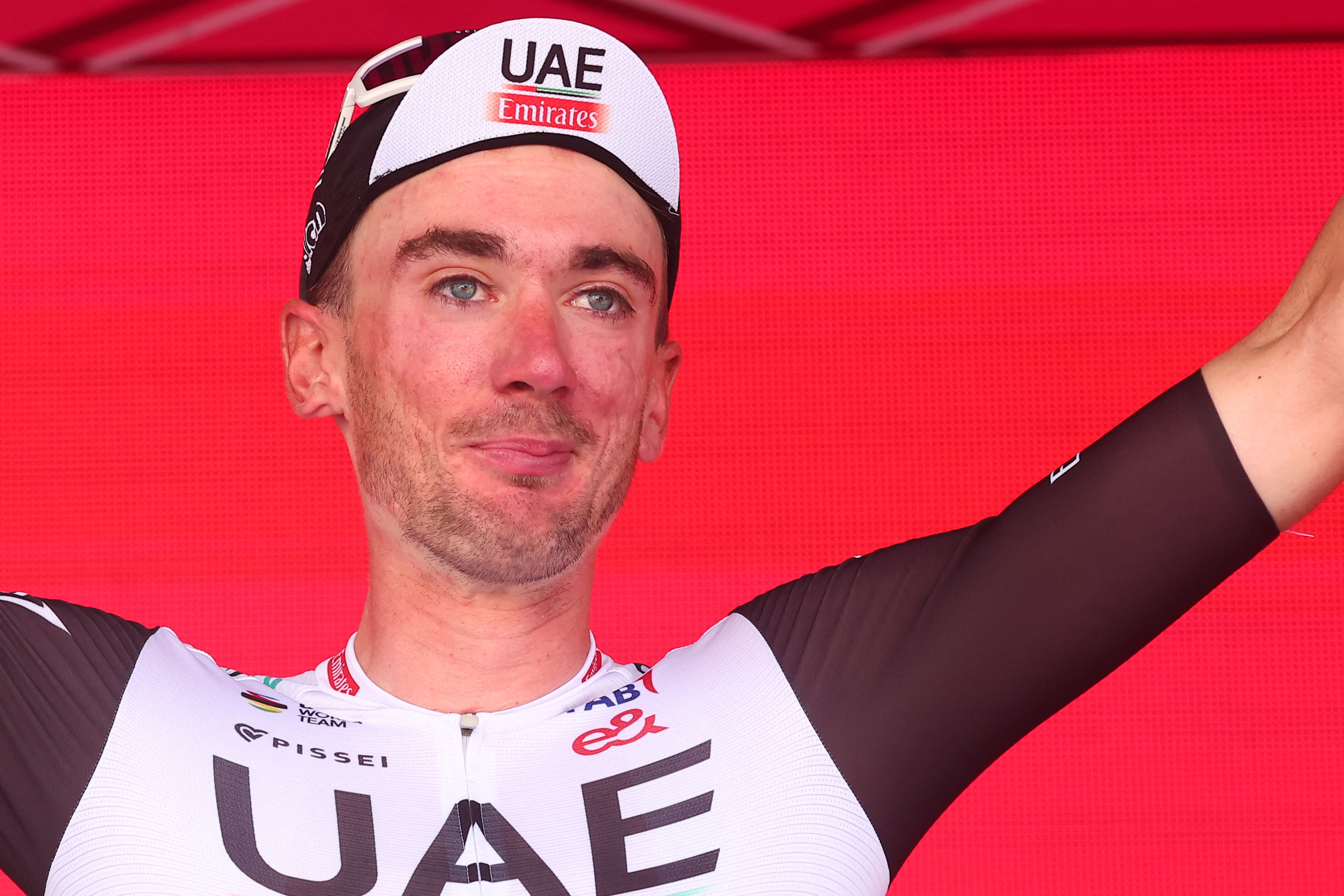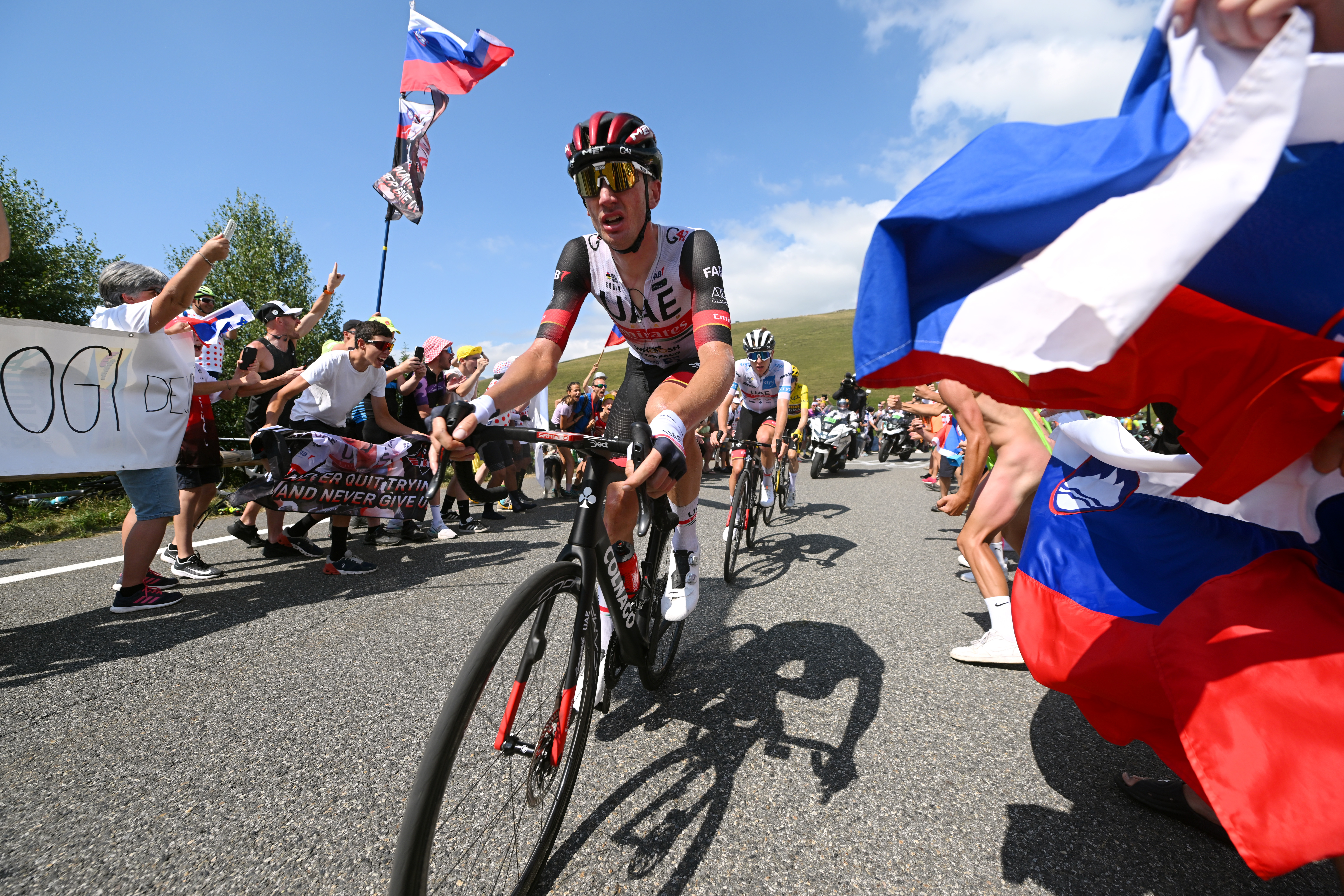‘There’s still room for improvement’ – Brandon McNulty on the Olympics, US cycling and the time trial arms race
American looks ahead to 2024 after long-term extension with UAE Team Emirates


Brandon McNulty didn’t have to think very long about it. He still had a year left to run on his contract with UAE Team Emirates, but when the team proposed a long-term extension this past summer, he saw no reason to demur. The American signed on the dotted line, tying himself to Tadej Pogačar’s squad until the end of 2027.
The presence of Pogačar, not to mention talents such as João Almeida, Adam Yates and Juan Ayuso, means that opportunities to lead the team in major races are limited but McNulty wasn’t tempted by the thought of greater liberty elsewhere.
Then again, maybe, as Kris Kristofferson would have it, freedom is just another word for nothing left to lose. When he weighed it all up, McNulty reckoned there was altogether more to gain by staying at one of the contemporary peloton’s two superpowers.
“It’s having the security and it’s also a really good team. They’re always improving, and I think they have a lot of belief in me too,” McNulty explains. “I’m comfortable here.”
McNulty has grown accustomed to the team’s rhythms since he joined from Rally ahead of the 2020 season. UAE Team Emirates, in turn, appear happy to let McNulty be McNulty when the occasion allows. Their flexibility extends to granting him an exemption from altitude camps after some youthful experiences of mile-high training left him drained rather than replenished.
“I did some altitude as a junior and I’ve always felt worse afterwards, which is strange. I wish it wasn’t the case,” McNulty says. “I feel like I’m an outlier, though, so maybe it’s partly in my head and I should try to do it more.”
The latest race content, interviews, features, reviews and expert buying guides, direct to your inbox!
The lack of an altitude camp certainly didn’t impede McNulty at his lone Grand Tour of 2023, the Giro d’Italia, where he won a gripping stage into Bergamo ahead of Ben Healy, nor was it a hindrance when he placed fourth in the time trial at the World Championships in Scotland. He labels the two performances as the highlights of his career to date.
Rather than cloister himself in a European ski resort with his team, McNulty spent most the period between the Giro and Worlds in the open expanses of Arizona, with a brief interlude in Tennessee to win the US time trial title. Whatever about the relative merits of training in thin air, the 25-year-old seems more certain of the benefits of spending time on home roads.
“I’ve always told the team that I feel I can train really well at home, just doing my own thing, and I feel like I’ve kind of proved it, because almost every time I do a long spell at home, I come out and race pretty well, so they have that faith in me,” McNulty says.
“In the summer in the Arizona, it gets pretty hot, and I’ve always felt pretty good after riding a while in the heat. I don’t know if that’s a mental thing or if it’s real, though there are definitely some studies that say it’s a benefit. I don’t know, but it always seems to work.”

McNulty will hope the experience might serve as a pointer for next summer, where the time trial at the Paris 2024 Olympics will be foremost in his thoughts. Despite picking up four medals at Worlds time trials in his junior and Under 23 days, he has yet to scale the same heights in the discipline at senior level.
Even at the Tokyo Olympics, where he was so impressive in placing sixth in an arduous road race, a tired McNulty slumped to a disappointing 24th in the time trial four days later.
After so many letdowns on the big day, McNulty’s fourth place in the 2023 World Championships in Scotland has given him reason to believe that a medal could be within reach at the Olympics next summer.
“I’ve been a time trial specialist, but I’ve been hit or miss the last few years,” McNulty admits. “Sometimes I was at Worlds, and I didn’t go well, so to finally have a good ride and to be up there was satisfying for me.”
Riding well is only a part of the story. The right equipment, always an important factor in time trialling, has become ever more essential in recent seasons. The steadily rising average speeds, McNulty says, tell their own story.
“Every year the time trials are getting faster and faster,” he says. “A few years ago, a 50kph average meant you were almost going to win or at least be in the top five or six, whereas now it’s 55kph or 56kph. So that’s been the big thing, getting everything dialled.
McNulty is too polite – or perhaps simply too professional – to complain publicly about his previous set-ups, but his obvious frustration on crossing the line in the time trial at last year’s Volta ao Algarve told its own story. He wasn’t the only one. At the end of 2022, UAE Team Emirates opted to switch suppliers for groupsets, tyres and wheels, and the alterations appeared to pay dividends against the watch.
“The whole sport every year is going up and up, but time trials are almost more of an arms race these days,” McNulty says. “In some ways that can be frustrating, but it’s all part of it, I guess.”
Yet while McNulty has greater clarity about the machine he will use on July 27, his route to the big day is yet to be decided.
At the Tokyo Olympics, McNulty’s post-Tour de France form saw him soar in the road race, but he was weighed down by a lack of specific preparation in the time trial. The data from this year’s early August Worlds was similar, with the road race appearing to reward riders who came directly from the Tour, while the time trial was dominated by men who, like McNulty, had tailored their build-up for the event.
“It seemed like riding the Tour helped for the road race, but in the time trial it didn’t help,” says McNulty. “After finally seeing I was able to do a Worlds time trial well, I’d like to be able to target that [at the Olympics], but it’s difficult with the timing of it, right after the Tour.”

Now on the cusp of his fifth season at WorldTour level, McNulty confesses that he has still to define himself as a rider. His background in time trialling and his climbing ability make him an obvious candidate in shorter stage races, while there have been glimpses – most notably at his debut Giro in 2020 – of a longer-term potential across three-week events should the opportunity ever arise.
In 2022, on the other hand, McNulty hinted at an aptitude for a less patient form of racing with a sequence of remarkable, long-range attacks that netted him solo victories at the Trofeo Calvia, the Faun-Ardèche Classic and, most notably, on a rugged stage of Paris-Nice.
When he went to the Giro in 2023, it was the express aim of chasing stage victories in a similar manner, while the general classification was the remit of Almeida and Jay Vine.
“I still feel like I’m trying to figure out what kind of rider I am. I mean, I try to be a GC rider, but then sometimes I have really good time trials and sometimes I’m good in one-day races,” McNulty says. “Maybe next year will be a chance to explore races other than just the big week-long stage races and whatnot. I’m still trying to grow.
“If I’m going well, then the time trial is still my speciality. But I feel like the hilly stages always suit me, and if I go through the races I’ve won, it’s always the same profile – hill, hill, hill and then downhill to the finish. So I guess those are my strengths, but I’m always trying to improve everything, so we’ll see.”
Circumstances have limited McNulty’s experience of the Ardennes Classics, which might change in 2024, while the assured way he dispatched Healy to win in Bergamo at the Giro left him warming to the idea of racing Il Lombardia with intent.
“I would definitely like to try to ride the one-days next year,” he says. “I’ve done Liège, but one year I was sick and the other year I was in that massive crash, so I haven’t had a good run at it, and it’s the same with Il Lombardia.”
Ultimately, however, a great deal of McNulty’s 2024 racing schedule will be defined by whether or not he is deployed in Pogačar’s service at the Tour de France.
Given his thunderous performance on the Slovenian’s behalf at Peyragudes in 2022, it was certainly surprising to see McNulty dispatched to the Giro in 2023, even if he viewed the change in programme as an opportunity rather than a demotion.
“We have such a good team that they were able to let me go to the Giro to target stages and try to help Almeida where I could. I don’t really know what I’ll do next year but I went to the Giro this year and that was a success,” says McNulty.
With Pogačar vying to wrest the crown back from Jonas Vingegaard, one imagines UAE will stack their roster next July. Both Almeida and Ayuso have already signalled their interest in making their Tour debuts, and so it remains to be seen where McNulty figures in the team’s three-week thinking.
Whether he features at the Tour or the Giro, McNulty is eager to find greater consistency in the high mountains. The best pound-for-pound performance of his career – or rather, the best W/kg-for-W/kg performance – came over the Col d’Azet and Peyragudes on the 2022 Tour, where only Pogacar and Vingegaard could hold his wheel, but McNulty would struggle the following day, and he had been subdued earlier in that Tour to boot.
“I need to work to be able to do that more days in a row, like every day,” he admits. “It was satisfying that I was able to do it at least once and I definitely want to do it again in the future.”

At 26, McNulty is resolutely a part of American cycling’s future, but he is also a link to a disappearing past. When he won the junior time trial world title in Doha in 2016, he surprisingly opted against moving directly to Europe to pursue a professional career, preferring instead to sign with Rally Cycling. Despite persistent interest from WorldTour suitors, he would spend three full seasons with the squad, preferring a programme that allowed him to develop at his own pace by flitting between racing on both sides of the Atlantic.
“That was almost one of the last years where you could have a full calendar going back and forth,” McNulty says of his time at Rally.
“Now it’s like you only get two or three races at the elite level in America and then everything else is in Europe. It’s definitely different.”
The squad, later renamed as Human Powered Health, helped propel several North Americans to the WorldTour over the years, including Sepp Kuss, Michael Woods and Ben King, but the shutters came down on the men’s programme at the end of the 2023 season. Their demise leaves the United States without a men’s ProTeam, while the slate of domestic road racing has shrunk considerably through the 2020s, starting with the headline losses of the Tour of California, Tour of Utah and the Colorado Classic.
The launchpad for so many American road careers has been steadily disappearing. Ambitious young riders in the United States now have a choice between moving to Europe as teenagers or racing a gravel-heavy programme in their home country. In some ways, McNulty and his contemporary Kuss are the last of a generation. As if to emphasise the fact, Roy Knickman’s LUX Cycling development squad, where McNulty raced as a junior, ceased operations at the end of last year.
“To see Rally disappearing is very sad,” McNulty says. “It’s tough, because when we had more races in the US, there was less talent. Now we have really good riders – a group of riders who can get good results and some good riders up and coming – but we have no races in the US besides Maryland.
“I really hope that more races will come back, but it’s tough. I don’t really know everything behind why or what, but it would be nice. Even the smaller races are disappearing. I don’t know if you’d call it trickling down or trickling up, but everything is disappearing. It’s a bit sad."
And yet, there are reasons for hope in the here and now. Sepp Kuss surprised everybody, including his Jumbo-Visma leaders, by winning the Vuelta a España – “It’s such a really unpredictable sport,” McNulty smiles – while Matteo Jorgenson and Neilson Powless were among the season’s outstanding performers.
McNulty, meanwhile, continued his own upward trajectory. He will expect more in 2024. “Maybe the improvements are less and less each year as I get older, but I feel like I’m still getting better,” he says. “I hope there’s still room for improvement.”


Barry Ryan was Head of Features at Cyclingnews. He has covered professional cycling since 2010, reporting from the Tour de France, Giro d’Italia and events from Argentina to Japan. His writing has appeared in The Independent, Procycling and Cycling Plus. He is the author of The Ascent: Sean Kelly, Stephen Roche and the Rise of Irish Cycling’s Golden Generation, published by Gill Books.